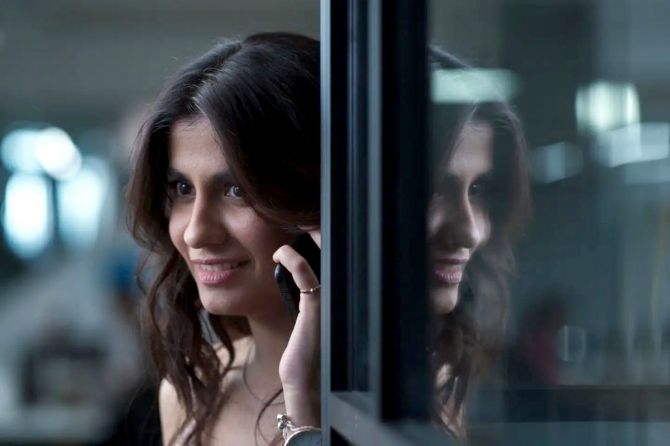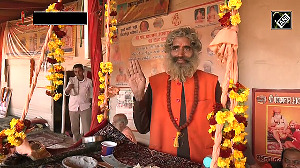'After many years of having to find new adjectives to say horrible, I realised I would rather write about things I want to write about.'

Just what goes inside the mind of a film critic?
Raja Sen -- who recently co-wrote the script for R Balki's Chup: Revenge of the Artist -- reviewed movies for Rediff.com for several years earlier this century.
"Sometimes, directors appreciate your analysis. But when they make a bad film and if your reviews are not good enough, you are singled out as someone who has an agenda. If it's from a director who you don't know, you understand the anger. But when it's from somebody who's thrilled whenever you are praising him but dismissive when you are not, you realise that their engagement with your work is very shallow," Raja tells Patcy N/Rediff.com.
Your journey as a film critic started at Rediff.com. How did your film journey start?
I started as a film critic at Rediff, but that was not what I wanted to be.
I started by (freelance) writing about Formula One on Rediff.
I had probably 30 people reading my articles, but I was really passionate about it.
After I had written a couple of pieces on Rediff, and after multiple rounds of grueling interviews, I was hired.
Coincidentally, at that time, message boards had just opened up. So there were 'I hate Raja Sen' groups on Orkut.
This is the pre-social media time. At that time, message boards had become a place of great animosity as well as fan clubs. It was interesting because I realised how important cinema is to the people of this country.
I had no idea.
Maybe a year later, I met Saurabh Usha Narang (the director of Vaastu Shastra) -- I had interviewed him forRediff -- and we had a couple of conversations.
For some reason, having read my reviews, he was convinced that I could be a writer and that I should write fiction.
So he brought me on board and we wrote a horror film together, which never got made.
But that scratched that itch.
I started thinking, maybe fiction is interesting, maybe cinema is something exciting that I could do.
It's something I hadn't thought of.
Even though the film never got made, I learned so much in that process of writing, rewriting and collaborating.
It was never Plan A, but it was exciting.
I started experimenting and wrote dialogues for a couple of movies.
I tried directing, but I remain convinced that I have not made for direction. I don't have the patience for it.
So now, this is Plan A, right?
Yes. I am currently creating a comedy series for OTT.
I'm going to be writing it and show-running it with a colleague. It's an attempt is to do something wild and different.
I feel in India, when we make comedies, we end up making slice-of-life comedies.
We are not making crazy concepts, so that's the next plan.
We will write till about January and then get into production.

Has there ever been an instance of your upsetting a film-maker or actor so much that they confront you personally?
Naming is not fun, but it's happened many times. I think you would know some of them.
There would be people who would call.
Directors get disgruntled, they get drunk and call you up.
Actors quote your lines from their film reviews, just to show you how little you matter to them but they remember everything.
It happens a lot actually.
Sometimes, directors appreciate your work and your analysis.
But when they make a bad film and if your reviews are not good enough, you are singled out as someone who has an agenda.
If it's from a director who you don't know, you understand the anger.
But when it's from somebody who's thrilled whenever you are praising him but dismissive when you are not, you realise that their engagement with your work is very shallow. That's always disappointing.
I have always taken it on the chin.
I've said what I wanted and if they are angry and if they want to say something, that's fine.
The whole point of a review is to essentially open a discussion.
So when these guys say something interesting and worthwhile, it can lead to a back and forth and that can be an eye-opener.
One phenomenon of this particular social media age is this: Almost everybody is a film critic. In such an age, what specific qualities should a film critic who wishes to stand out imbibe?
I think there is a trap in wishing to stand out.
With so many anonymous voices, people hunger for attention with their criticism.
That's why you have YouTubers or Tik Tokers or whoever, who use swear words in reviews or be really cruel to someone, just to get noticed.
Social media or not, I think for a critic, the important thing is to not just present an informed opinion but to justify that opinion within the piece.
Also, the reader should look at it and say, 'Yeah, he didn't like this film for these reasons but I think I might actually like this film for the same reasons.'
So that leeway should be there.
It's an opinion. There's no complete right or wrong.
I feel like as long as you can, show your passion for the art form.
Try to find something new to say about a film.
Try to find a unique viewpoint.
Once that happens from an authentic space, I think readers, followers and jobs will follow.
I think all the critics that we have admired over the years, are people whose personality comes out through their reviews.
I don't feel like someone says, reviewers shouldn't be biased. I completely disagree.
Reviewers are human and they obviously have biases.
But those biases should be clear in the review itself.
Suppose I like a certain film-maker. That only means that other people, who are reading my work, should know I like that film-maker and that I am expecting more from this film than perhaps the average viewer because I have higher expectations.

Is piggybacking on a really bad film to showcase your wit a cheap way of getting people to like you?
That's a good question.
I feel it's not cheap.
Sometimes when you are writing reviews of films that are very bad, and that no one is really going to watch, you end up finding a way to amuse yourself.
As a critic, have some entertainment in that review so that even if people are not going to watch the film, they should have fun with the review.
These are ways to cope with bad cinema.
Having said that, I think once you start doing it for a while, you realise that it's very exhausting. It's exhausting to be dismissive of a film and exhausting to watch bad films.
I think that's what happened to me more and more.
I realised that after many years of having to find new adjectives to say horrible, I realised that I would rather write about things I want to write about.
Most critics will agree that it's fun to write really bad reviews and it's exciting to write really good reviews but it's those middle-of-the-road, those two-star unremarkable movies that are very hard to write about.
I feel there's so much noise out there, so much clutter, that I feel there's no point adding to it.
If it's unremarkable, don't remark.












 © 2025
© 2025